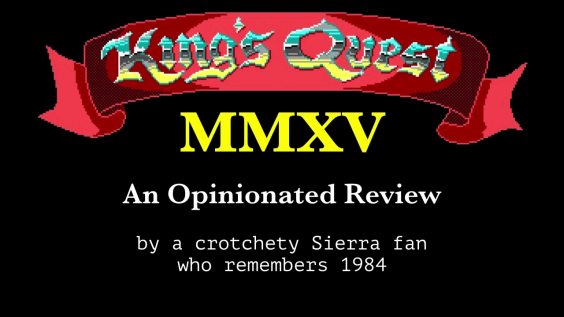Sierra Then and Now: Opinions!
Written by Judith // January 30, 2016 // In the Museum // No comments
Part King’s Quest 2015 review and part love letter to classic Sierra, Eric Wing’s 3-part YouTube series Why We Loved Sierra Games: 1984 fan reviews King’s Quest 2015 clocks in at a hefty one hour and fifteen minutes — but it’s worth watching for anyone who yearns for the adventure games of yore. It’s filled with game clips plus bits from interviews and talks from some of the best creators in game development. It’s a great introduction to the world of adventure games. Since Eric calls it “An Opinionated Review,” we asked our volunteers for their opinions.
Season, one of our collections crew, says:
I grew up on Sierra games and, like Wing, have not found anything in modern gaming that quite captures my heart like they did. Though, unlike Wing who seems unsatisfied with today’s gaming selection, I have fallen in love with modern games in a different way for their stories, characters, and dialogue, games like Mass Effect and Dragon Age.
Ben says this made him think more about game deaths.
He’s right in that death is, in general, a big problem with games. Nobody likes losing progress, and it frustrates people when a single mistake can ruin hours of work. But at the same time, if you make it feel like there’s nothing on the line, then you lose all sense of stress.
The problem is that we all know there’s nothing on the line. Nothing kills suspense in a horror game faster than playing it on a too-high difficulty; once you die a dozen times, you’re just not scared of death anymore. It’s that thing that makes you push the “reload” button, and then you’re magically resurrected.
Eric seems to think that Sierra-style deaths are a better solution, and I strongly disagree; they just teach the player to hit the “save” button, like, every five minutes. I think we need some way to force the player to lose a “little” progress on death, but not necessarily a “lot” of progress. At the same time, we can actually let the player get into an impossible situation, as long as we promise to kill them off soon. This is something we can’t do with a manual save system because they might accidentally save in the doomed state!
Season adds,
I concede they (newer games) don’t offer the open world exploration and creative problem solving offered by Sierra games – such as his mention of being limited to “red, green, and blue” as choices – but I do find the same thrill when a seemingly insignificant choice I made early on impacts how characters react to me, even in later games.
Ben viewed the retrospective genre with a grain of salt:
The biggest problem I have with many of these game retrospectives is that people tend to focus on the parts they remember being the best and gloss over the parts that didn’t work. This results in some unintentionally biased views; people are usually talking about the first game they played in a genre, before they really knew what to expect from the genre or possibly from gaming in general.
There are a few common giveaways to this; it’s when people start talking about “exploration” and how you could “do anything you wanted” and how it was like “discovering a different world”. This is because, back then, they were a kid and didn’t realize how restricted they were. They also just weren’t familiar with games in general.
After setting the stage in his videos with extensive analyses of puzzle solving, cutscenes, dialog choices and deaths, Eric Wing concedes that King’s Quest 2015 is true to the style and humor of the originals and that the graphics are stunning. But he doesn’t think this makes it as good a game as the original King’s Quest.
Ben closes with:
Twenty years from now there will be people looking back on the good ol’ days, when you could boot up Minecraft and do whatever you wanted and it was like discovering a new world. Which, they will say, is something that has been lost from Minecraft 2 and Minecraft 3 and all the spinoffs.
At DGM, we’ve been delighted by the steady stream of gamers, age 6 to 16, who say they like the early games best because the leave more room for imagination. Perhaps our next generation of gamers will be looking for games that offer less – which in some ways, may be more.


